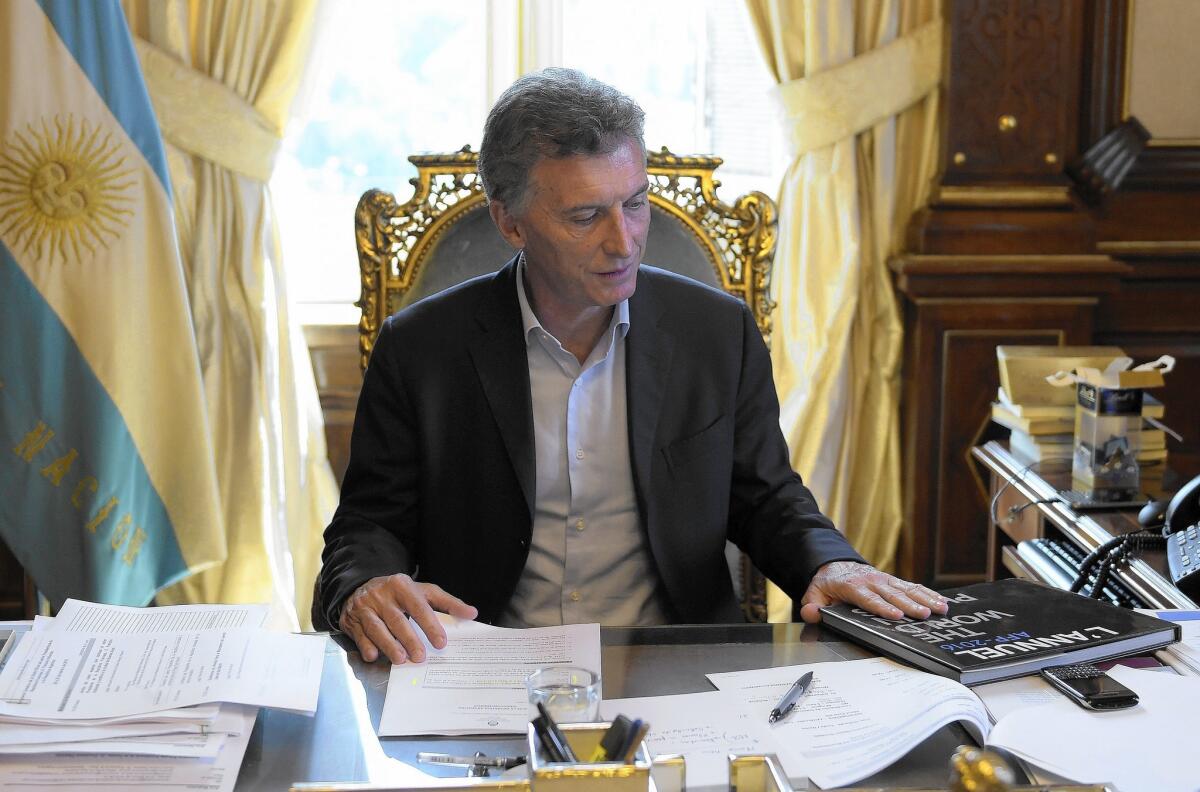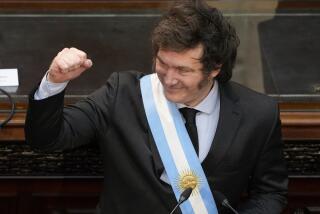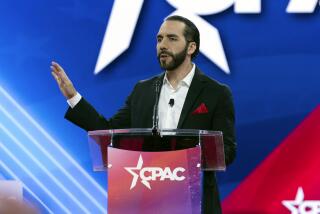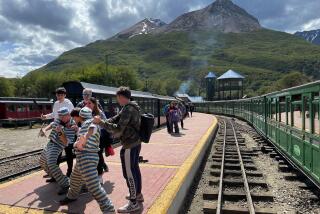Obama’s visit to Argentina is a chance to heal old wounds and present new opportunities

President Obama could have visited any number of countries in South America.
In choosing Argentina, the latest nation to turn away from the socialist leaders who have dominated the continent for the last decade, he is hoping to launch a new era of U.S. engagement.
For Argentina’s new president, Mauricio Macri, the visit is a chance to start luring back foreign investors and help a sputtering economy.
With Obama arriving directly from his historic trip to Cuba, the two presidents were scheduled to meet Wednesday in Buenos Aires. Obama and his family will also travel to the southern resort city of Bariloche before returning to Washington on Friday.
See more of our top stories on Facebook >>
It is the first visit to Argentina by a U.S. president since George W. Bush came here in 2005 — and an opportune moment.
A downturn in commodity prices and overspending on social programs have damaged economies across Latin America, hastening political shifts not only in Argentina but also in Brazil, Venezuela and Bolivia. Obama enjoys high approval ratings in Argentina and across the continent, despite having rarely traveled in the region.
Obama sees his visit as demonstrating a new era of “engagement and respectful partnership” in Latin America and a departure from domineering attitudes of the past, Ben Rhodes, deputy national security advisor, said last week.
To that end, Obama plans to acknowledge an old ghost in Argentina.
The president and his family are arriving on the eve of the 40th anniversary of the 1976 military coup that marked the start of the so-called dirty war, in which the military junta killed an estimated 30,000 political opponents.
Many Argentines have never forgiven the U.S. for what they see, at best, as tacit support for the junta, which ruled until 1983. A bitter memory for many here is President Reagan’s hosting of junta leader Roberto Viola at the White House in 1981, well after the junta’s atrocities became known.
The animosity was a factor in widespread demonstrations against Bush in 2005 when he visited to attend the Summit of the Americas. Venezuela’s late President Hugo Chavez led anti-Bush chants at an “alternative summit” that was encouraged by then-President Nestor Kirchner.
Obama has agreed to release secret diplomatic papers that may detail what role the U.S. played during the junta’s rule. The release, combined with Obama’s plan to lay a wreath at a memorial for junta victims Wednesday, demonstrates the president’s “clear-eyed recognition of the past,” Rhodes said.
Manuel Mora y Araujo, a political consultant in Buenos Aires, said that the document release may not be decisive in erasing memories of U.S. complicity with the junta but that it will help.
“It’s more than a gesture. The release of documents will advance the knowledge of what happened during the period,” Mora y Araujo said.
Still, left-wing groups are expected to march against the U.S. on Wednesday in the capital’s Plaza de Mayo.
For his part, Macri hopes the rare presidential visit broadcasts to the world that Argentina is open for business after 12 years of socialist governments that often made foreign companies feel unwelcome.
“The gesture of the visit is very important, a sign of the interest and priority that the U.S. has put on President Macri’s administration,” Foreign Minister Susana Malcorra told reporters Monday.
Macri, who took office in December, has been negotiating a deal to pay U.S. investors still owed money from Argentina’s 2002 bond default. Paying off the so-called holdouts will allow Argentina to once again borrow money on global debt markets by issuing bonds at reduced interest rates.
NEWSLETTER: Get the day’s top headlines from Times Editor Davan Maharaj >>
“His plan is that once the holdouts are paid off, the government, the provinces and private companies can then issue bonds and use proceeds to stimulate the economy,” said Dan Gerold of G&G Energy Consultants in Buenos Aires. “Macri wants to launch a program to build roads, ports and other public works.”
Macri and Obama — who will be accompanied by Commerce Secretary Penny Pritzker and more than 400 U.S. business executives — are expected to announce bilateral agreements and trade deals covering renewable energy, agriculture and technology.
Macri desperately needs those sorts of investments and the jobs they will create to help restore the economy he inherited from his predecessor, Cristina Fernandez de Kirchner, who took over the presidency from her late husband in 2007.
Their generous social welfare programs reduced poverty but contributed to the current inflation rate of 35% as well as yawning budget deficits and a third straight year of little or no economic growth.
Cynthia Moskovits, an economist at the FIEL think tank in Buenos Aires, said Obama’s visit could help restore confidence among foreign investors, who had largely abandoned Argentina.
“It’s a gesture of support for Macri but also a recognition that after 12 years of authoritarianism Argentina is ready to participate in a normal, reasonable and respectful way in world affairs, giving investors clear rules,” she said.
To reduce the deficit, Macri has started cutting subsidies in electricity, gas and transportation, while eliminating thousands of make-work jobs created by Kirchner for her supporters. He also devalued the currency, a move that economists generally support but that has made inflation worse.
Although a majority of Argentines back Macri’s moves, analysts said that support could decline if the new policies failed to increase economic growth, produce jobs and compensate for the reductions in subsidies and social spending.
Special correspondents Kraul and D’Alessandro reported from Bogota, Colombia, and Buenos Aires, respectively.
ALSO
Police identify two Brussels bombing suspects, one still on the run
Torture or steadiness? Terrorism again collides with 2016 campaign
Is an Israeli firm helping the FBI crack San Bernardino terrorist’s iPhone?
More to Read
Start your day right
Sign up for Essential California for news, features and recommendations from the L.A. Times and beyond in your inbox six days a week.
You may occasionally receive promotional content from the Los Angeles Times.






